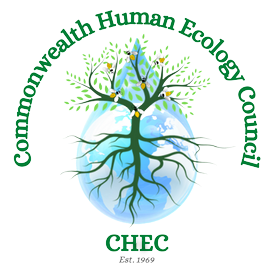COVID-19 Framework Receives CHEC Endorsement
Last week the Commonwealth Human Ecology Council endorsed the InterAction Council COVID-19 Framework. Despite the CHEC office being closed we felt it was important to lend our support to this important framework which is also supported by former world leaders. The framework urges global cooperation to beat coronavirus and supports the idea of a better future.
Two Purposes of the COVID-19 Framework
- To inform national, multi-lateral and global responses - to address the COVID-19 Pandemic now, with a view to enhancing co-ordinated global, regional and national responses; the framework provides a comprehensive multi-sector response that can potentially be adapted for national and multi-lateral planning processes.
- To shape the recovery response and future recommendations - with an emphasis on Building Back Green and strengthening Public Health as a key component of health systems. These are intended as initial recommendations to shape the recovery process and stimulate further discussion, and will inform the InterAction Council Plenary session later this year. Please let me know any comments and ideas on how to take forward the below recommendations:

The COVID-19 Framework also includes initial recommendations for future pandemics and emergency responses. The eight recommendations show areas where things can be improved moving forward. CHEC was particular pleased to see that the first recommendation is to "Build Back Green" and support a green movement that would help address the climate crisis. The full recomendations are:
1. Build Back Green – as part of the recovery process,invest in solutions that address the climate crisis and enable progress towards the Sustainable Development Goals including: nature based solutions, renewable energy, low carbon infrastructure, climate change adaptation.
2. Enable the Digital Transformation – continue the rapid digital shift during the pandemic to create connected communities that are able to share learning, find solutions and respond at scale to building back green; ensure digital governance to prevent misinformation, hacking and scams; and enhance efficient ways of working, with reduced travel, with the creation of digital health systems for Planet, Place and People for a common future for all.
3. Courageous and Collaborative Leadership – for the wellbeing of future generations, in order to apply learning from the pandemic, re scaling up emergency processes and unified efforts to address the climate and environmental crisis; empower young people with the skills and experience required to address emergencies and to secure a healthy planet for all.
4. Establish an Independent Global Emergency Mechanism – tasked with enhanced surveillance and monitoring, risk assessment and detection, with rapid alert and response systems; such an organisation needs to be able to establish a global and multi-sector response at speed, communicate freely, have independent governance and be able to collaborate and mobilise action across the international community.
5. Invest in Emergency Preparedness and Response – the Commission for a Global Health Risk Framework for the Future recommends an annual global investment of $4.5 billion for pandemic preparedness, including public health preventative measures and research. Such an organisation could have wider responsibilities, including relevant aspects to address the Planetary Emergency.
6. Strengthen Public Health and Health Protection – invest in and enhance essential public health operations and services within every country– a weak link anywhere is a weak link for us all – ensure that this is embedded within national health systems to enable national, regional and local coordination and surge capacity during outbreaks.
7. Enhance links with multi-sector emergency mechanisms – ensure that health risks and planning, including for pandemics are incorporated across global, national, regional and local emergency planning systems and governance mechanisms – building upon the Sendai Framework for Disaster Risk Reduction.
8. Increase Research into Prevention and Preparedness - the Commission for a Global Health Risk Framework for the Future recommends an annual global investment of $1 billion for research into pandemic preparedness; investing in research on the effectiveness of preventative and health protection measures provides the most scope for reducing avoidable deaths, whilst maximising economic savings, and reducing global security impacts.
CHEC fully supports the framework and will look to support other great iniatives that looks to address the environment and coronavirus going forward. Full information on the framework can be found here.
CHEC joined the following organisations in their endorsement of the framework: One Young World - OYW, Club of Rome, World Federation of Public Health Associations - WFPHA, World Organisation of Family Doctors -WONCA, World Psychiatrists Association - WPA, Commonwealth Medical Association - CMA, Commonwealth Centre for Digital Health - CWCDH, Commonwealth Local Government Forum - CLGF, Commonwealth Human Ecology Council - CHEC, Society for the Advancement of Science and Technology - SASTA, Arab World Association of Young Scientists - ArabWAYS, The Faculty of Public Health UK – FPH, The Aga Khan University, East Africa, African Medical and Research Foundation - AMREF, and College of Health Sciences, University of Nairobi, Kenya.
